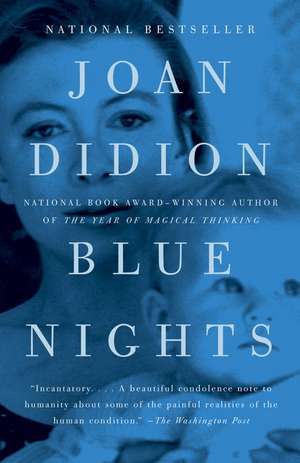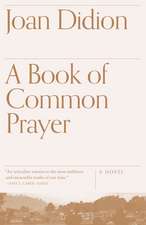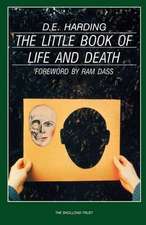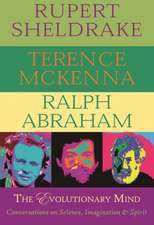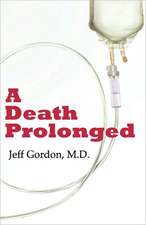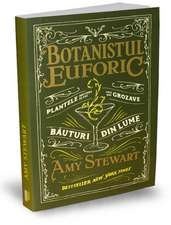Blue Nights
Autor Joan Didionen Limba Engleză Paperback – 30 iun 2012
Vezi toate premiile Carte premiată
Indies Choice Book Awards (2012)
From one of our most powerful writers, a work of stunning frankness about losing a daughter.
Richly textured with memories from her own childhood and married life with her husband, John Gregory Dunne, and daughter, Quintana Roo, this new book by Joan Didion is an intensely personal and moving account of her thoughts, fears, and doubts regarding having children, illness and growing old.
As she reflects on her daughter’s life and on her role as a parent, Didion grapples with the candid questions that all parents face, and contemplates her age, something she finds hard to acknowledge, much less accept. Blue Nights—the long, light evening hours that signal the summer solstice, “the opposite of the dying of the brightness, but also its warning”—like The Year of Magical Thinking before it, is an iconic book of incisive and electric honesty, haunting and profound.
| Toate formatele și edițiile | Preț | Express |
|---|---|---|
| Paperback (2) | 63.14 lei 3-5 săpt. | +7.73 lei 7-11 zile |
| HarperCollins Publishers – 7 iun 2012 | 63.14 lei 3-5 săpt. | +7.73 lei 7-11 zile |
| VINTAGE BOOKS – 30 iun 2012 | 80.28 lei 17-23 zile | +6.95 lei 7-11 zile |
Preț: 80.28 lei
Nou
Puncte Express: 120
Preț estimativ în valută:
15.36€ • 16.04$ • 12.68£
15.36€ • 16.04$ • 12.68£
Carte disponibilă
Livrare economică 21-27 martie
Livrare express 11-15 martie pentru 16.94 lei
Preluare comenzi: 021 569.72.76
Specificații
ISBN-13: 9780307387387
ISBN-10: 0307387380
Pagini: 188
Dimensiuni: 133 x 203 x 16 mm
Greutate: 0.23 kg
Editura: VINTAGE BOOKS
Colecția Vintage Books
ISBN-10: 0307387380
Pagini: 188
Dimensiuni: 133 x 203 x 16 mm
Greutate: 0.23 kg
Editura: VINTAGE BOOKS
Colecția Vintage Books
Extras
In certain latitudes there comes a span of time approaching and following the summer solstice, some weeks in all, when the twilights turn long and blue. This period of the blue nights does not occur in subtropical California, where I lived for much of the time I will be talking about here and where the end of daylight is fast and lost in the blaze of the dropping sun, but it does occur in New York, where I now live. You notice it first as April ends and May begins, a change in the season, not exactly a warming—in fact not at all a warming—yet suddenly summer seems near, a possibility, even a promise. You pass a window, you walk to Central Park, you find yourself swimming in the color blue: the actual light is blue, and over the course of an hour or so this blue deepens, becomes more intense even as it darkens and fades, approximates finally the blue of the glass on a clear day at Chartres, or that of the Cerenkov radiation thrown off by the fuel rods in the pools of nuclear reactors. The French called this time of day “l’heure bleue.” To the English it was “the gloaming.” The very word “gloaming” reverberates, echoes— the gloaming, the glimmer, the glitter, the glisten, the glamour—carrying in its consonants the images of houses shuttering, gardens darkening, grass-lined rivers slipping through the shadows. During the blue nights you think the end of day will never come. As the blue nights draw to a close (and they will, and they do) you experience an actual chill, an apprehension of illness, at the moment you first notice: the blue light is going, the days are already shortening, the summer is gone. This book is called “Blue Nights” because at the time I began it I found my mind turning increasingly to illness, to the end of promise, the dwindling of the days, the inevitability of the fading, the dying of the brightness.
Blue nights are the opposite of the dying of the brightness, but they are also its warning.
From the Hardcover edition.
Blue nights are the opposite of the dying of the brightness, but they are also its warning.
From the Hardcover edition.
Notă biografică
Joan Didion was born in Sacramento, California, and now lives in New York City. She is the author of five novels and eight previous books of nonfiction. Her collected nonfiction, We Tell Ourselves Stories in Order to Live, was published by Everyman's Library in 2006.
Recenzii
“Incantatory.... A beautiful condolence note to humanity about some of the painful realities of the human condition.” —The Washington Post
“Heartbreaking.... A searing inquiry into loss and a melancholy mediation on mortality and time.” —Michiko Kakutani, The New York Times
“Joan Didion is a brilliant observer, a powerful thinker, a writer whose work has been central to the times in which she has lived. Blue Nights continues her legacy.” —The Boston Globe
“Exemplary...provocative.... [Didion] comes fully to realize, and to face squarely, the dismaying fact that against life’s worst onslaughts nothing avails, not even art; especially not art.” —John Banville, The New York Times Book Review
“A beautiful, soaring, polyphonic eulogy.... What appears on the surface to be an elegantly, intelligently, deeply felt, precisely written story of the loss of a beloved child is actually an elegantly, intelligently, deeply felt, precisely written glimpse into the abyss, a book that forces us to understand, to admit, that there can be no preparation for tragedy, no protection from it, and so, finally, no consolation.” —The New York Review of Books
“Profoundly moving.... This is first and last a meditation on mortality.” —San Francisco Chronicle
“Ms. Didion has translated the sad hum of her thoughts into a profound meditation on mortality. The result aches with a wisdom that feels dreadfully earned.” —The Economist
“For the great many of us who cherish Joan Didion, who can never get enough of her voice and her brilliant, fragile, endearing, pitiless persona, [Blue Nights] is a gift.” —Newsday
“Exquisite.... She applies the same rigorous standards of research and meticulous observation to her own life that she expects from herself in journalism. And to get down to the art of what she does, her sense of form is as sharp as a glass-cutter’s, and her sentences fold back on themselves and come out singing in a way that other writers can only wonder at and envy.” —The Washington Independent Review of Books
“Ms. Didion has created something luminous amid her self-recrimination and sorrow. It’s her final gift to her daughter—one that only she could give.” —Wall Street Journal
“Didion’s bravest work. It is a bittersweet look back at what she’s lost, and an unflinching assessment of what she has left.” —BookPage
“Yes, this is a book about aging and about loss. Mostly, though, it is about what one parent and child shared—and what all parents and children share, the intimacy of what bring you closer and what splits you apart.” —Oprah.com
“Haunting.” —Entertainment Weekly
“Breathtaking.... With harrowing honesty and mesmerizing style, Didion chronicles the tragic death of her daughter, Quintana, interwoven with memories of their happier days together and Didion’s own meditations on aging.” —Newsweek
“Darkly riveting.... The cumulative effect of watching her finger her recollections like beads on a rosary is unexpectedly instructive. None of us can escape death, but Blue Nights shows how Didion has, with the devastating force of her penetrating mind, learned to simply abide.” —Elle
“In this supremely tender work of memory, Didion is paradoxically insistent that as long as one person is condemned to remember, there can still be pain and loss and anguish.” —Christopher Hitchens, Vanity Fair
“Didion’s latest memoir unflinchingly reflects on old age and the tragedy of her daughter’s death.”
—Best New Paperbacks, Entertainment Weekly
“Heartbreaking.... A searing inquiry into loss and a melancholy mediation on mortality and time.” —Michiko Kakutani, The New York Times
“Joan Didion is a brilliant observer, a powerful thinker, a writer whose work has been central to the times in which she has lived. Blue Nights continues her legacy.” —The Boston Globe
“Exemplary...provocative.... [Didion] comes fully to realize, and to face squarely, the dismaying fact that against life’s worst onslaughts nothing avails, not even art; especially not art.” —John Banville, The New York Times Book Review
“A beautiful, soaring, polyphonic eulogy.... What appears on the surface to be an elegantly, intelligently, deeply felt, precisely written story of the loss of a beloved child is actually an elegantly, intelligently, deeply felt, precisely written glimpse into the abyss, a book that forces us to understand, to admit, that there can be no preparation for tragedy, no protection from it, and so, finally, no consolation.” —The New York Review of Books
“Profoundly moving.... This is first and last a meditation on mortality.” —San Francisco Chronicle
“Ms. Didion has translated the sad hum of her thoughts into a profound meditation on mortality. The result aches with a wisdom that feels dreadfully earned.” —The Economist
“For the great many of us who cherish Joan Didion, who can never get enough of her voice and her brilliant, fragile, endearing, pitiless persona, [Blue Nights] is a gift.” —Newsday
“Exquisite.... She applies the same rigorous standards of research and meticulous observation to her own life that she expects from herself in journalism. And to get down to the art of what she does, her sense of form is as sharp as a glass-cutter’s, and her sentences fold back on themselves and come out singing in a way that other writers can only wonder at and envy.” —The Washington Independent Review of Books
“Ms. Didion has created something luminous amid her self-recrimination and sorrow. It’s her final gift to her daughter—one that only she could give.” —Wall Street Journal
“Didion’s bravest work. It is a bittersweet look back at what she’s lost, and an unflinching assessment of what she has left.” —BookPage
“Yes, this is a book about aging and about loss. Mostly, though, it is about what one parent and child shared—and what all parents and children share, the intimacy of what bring you closer and what splits you apart.” —Oprah.com
“Haunting.” —Entertainment Weekly
“Breathtaking.... With harrowing honesty and mesmerizing style, Didion chronicles the tragic death of her daughter, Quintana, interwoven with memories of their happier days together and Didion’s own meditations on aging.” —Newsweek
“Darkly riveting.... The cumulative effect of watching her finger her recollections like beads on a rosary is unexpectedly instructive. None of us can escape death, but Blue Nights shows how Didion has, with the devastating force of her penetrating mind, learned to simply abide.” —Elle
“In this supremely tender work of memory, Didion is paradoxically insistent that as long as one person is condemned to remember, there can still be pain and loss and anguish.” —Christopher Hitchens, Vanity Fair
“Didion’s latest memoir unflinchingly reflects on old age and the tragedy of her daughter’s death.”
—Best New Paperbacks, Entertainment Weekly
Descriere
Descriere de la o altă ediție sau format:
From one of our most powerful writers, a work of stunning frankness about losing a daughter.
Premii
- Indies Choice Book Awards Honor Book, 2012
